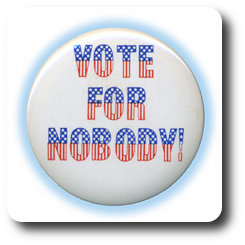Saturday 20 March, 10.00am until 11.30am, The Great Hall
 For the past generation, participation in elections has been declining in Britain and indeed much of the West. The end of the Cold War and the demise of ideological conflict has rendered politics a minority sport, bereft of ideas to inspire the public. While some politicians bemoan our ‘apathy’, there is little doubt that politics itself is blighted by a serious malaise. In this context, and following last year’s MPs’ expenses scandal, it would be all too easy to declare ‘a plague on all their duckhouses’ and boycott the election. But would that mean giving up on democracy?
For the past generation, participation in elections has been declining in Britain and indeed much of the West. The end of the Cold War and the demise of ideological conflict has rendered politics a minority sport, bereft of ideas to inspire the public. While some politicians bemoan our ‘apathy’, there is little doubt that politics itself is blighted by a serious malaise. In this context, and following last year’s MPs’ expenses scandal, it would be all too easy to declare ‘a plague on all their duckhouses’ and boycott the election. But would that mean giving up on democracy?
Arguably, ‘real politics’ has always taken place away from the Westminster Village, but the broad social movements that once gave substance to that claim have perhaps fared even worse than the parties themselves, so what is the alternative to simply putting an X in a box? Some believe that rather than electoral politics or even traditional movements, 21st century politics will take the form of Twitter storms, climate camps and ethical consumerism, but are these really viable means for democratic decision-making? Others argue that real power increasingly lies not at Westminster but in Brussels, so would we do better to campaign for more democracy in Europe, or will we simply find the same problems there on a different scale?
With no obvious alternative channel for our democratic energies, how might we avoid either naïve enthusiasm for voting as an end in itself, or cynical rejection of democracy as a meaningless charade? Some suggest Parliament can be reinvigorated by the introduction of independent MPs free from the party whips and more directly accountable to voters. Would this represent the elevation of principle above tribal loyalties, or rather the depoliticisation of politics? Can we start instead by setting an agenda for a politics that makes a difference, whether we vote or not? Is the election doomed to be a competition between uninspiring politicians, or can we intervene in the name of real politics?
This session will be preceded by a welcome address by Andrew Ritchie, CBE, director, Goodenough College and Claire Fox, Director, Academy of Ideas, panellist, BBC Radio 4’s Moral Maze.
 | Professor Frank Furedi sociologist and social commentator; author, What's Happened to the University?, Power of Reading: from Socrates to Twitter, On Tolerance and Authority: a sociological history |
 | Wes Streeting head of education, Stonewall; former president, NUS |
 | Pam Giddy director, Power 2010; co-founder and former director, Power Inquiry |
 | David Seymour co-author Why Vote – a guide for those who can't be bothered; former political editor, Mirror Group, leader writer, Daily Mail; founder, Student Mirror |
| Chair: | |

|
Dolan Cummings
associate fellow, Academy of Ideas; author, That Existential Leap: a crime story (forthcoming from Zero Books) |
 Whoever wins, Britain will have a hung parliament
Whoever wins, Britain will have a hung parliament
Size isn’t everything – history shows that it takes more than a majority of members of parliament to make a strong and purposeful government.
Mick Hume, spiked, 10 March 2010Cameron's team sees itself as the good guys but, viewed from the outside, the whole system is decomposing.
Rafael Behr, New Statesman, 4 March 2010
 Why Vote? argues that people today are far from apathetic in fact, they care passionately about a wide range of issues. The problem is making them see the relevance of the political process to their lives.
Why Vote? argues that people today are far from apathetic in fact, they care passionately about a wide range of issues. The problem is making them see the relevance of the political process to their lives.
Jo Phillips & David Seymour, Biteback, 4 March 2010
Polling reveals deep public ambivalence about the upcoming election and a disintegration of faith in the mainstream political parties.
Stuart Wilks-Heeg and David Ells, openDemocracy, 2 March 2010Could part of the public’s disengagement with politics be a result of our own ignorance?
Mark Easton, BBC Politics, 17 February 2010A miserable absence of meaning in our politics leaves the public so cold that a party with 20% of the electorate could take office.
John Harris, Guardian Comment is free, 10 February 2010Our leaders talk about democratic reform, but citizens should be at its heart.
Pam Giddy, Guardian, 17 January 2007Picking on The Apprentice: Para Mullan - Bullying in the workplace
"There was an astonishing range of opinions expressed while I was there, some of them pure nonsense, others profound, all of them provocative."
Daniel Moylan, Deputy chairman, Transport for London